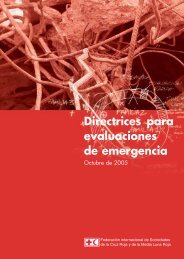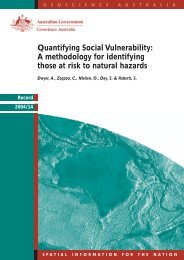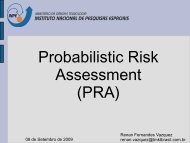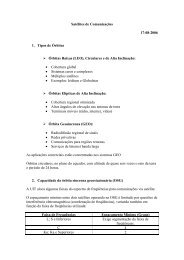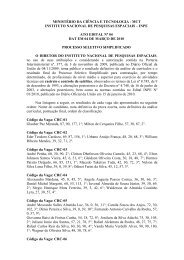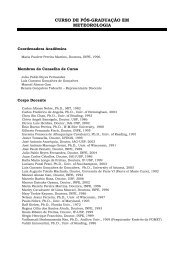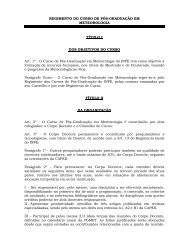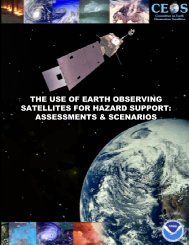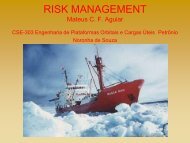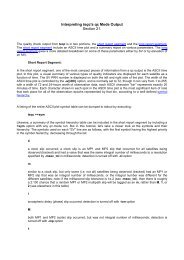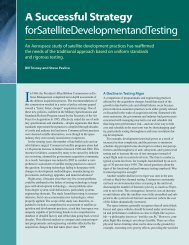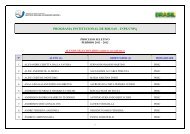Living with Risk. A global review of disaster reduction initiatives
Living with Risk. A global review of disaster reduction initiatives
Living with Risk. A global review of disaster reduction initiatives
Create successful ePaper yourself
Turn your PDF publications into a flip-book with our unique Google optimized e-Paper software.
Selected application <strong>of</strong> <strong>disaster</strong> <strong>reduction</strong> measures<br />
5<br />
Principles for Early Warning Systems at INTERNATIONAL and REGIONAL levels<br />
1. In the interest <strong>of</strong> concerted international efforts to reduce the adverse effects <strong>of</strong> natural and similar <strong>disaster</strong>s,<br />
the technologically advanced countries have an obligation to encourage and support improved early<br />
warning practices in developing countries, small island developing States, economies in transition, and<br />
other <strong>disaster</strong>-prone countries <strong>with</strong> special circumstances.<br />
2. Primarily affected countries equally have a primary responsibility to conduct a rigorous audit <strong>of</strong> the effectiveness,<br />
or consequential identification <strong>of</strong> needs, <strong>of</strong> their early warning capabilities. The conduct <strong>of</strong> post-mortem<br />
assessments <strong>of</strong> regional and national warning system capabilities is particularly relevant following any<br />
<strong>disaster</strong> event.<br />
3. Specialized regional and <strong>global</strong> centres involved in the preparation and dissemination <strong>of</strong> warnings, such as the<br />
WMO Regional Specialized Meteorological Centres (RSMCs) provide important links to national early<br />
warning systems. The application <strong>of</strong> their technical capabilities and the utility <strong>of</strong> their products should<br />
be carefully integrated <strong>with</strong> the needs <strong>of</strong> the countries being served, including any necessary clarification<br />
about the warning responsibilities between these centres and national agencies in the same region.<br />
4. In the interest <strong>of</strong> protecting people from the risk <strong>of</strong> natural hazards, it is essential that the formulation<br />
and presentation <strong>of</strong> warnings be based on the best available technical and scientific knowledge, and free <strong>of</strong><br />
political distortion or manipulation.<br />
5. International bodies and regional organizations must work to maintain the vital importance <strong>of</strong> timely<br />
exchange and unrestricted access <strong>of</strong> observational data and other warning information between countries, particularly<br />
when hazardous conditions affect neighbouring countries.<br />
6. Timely, accurate and reliable warnings should be understood in the context <strong>of</strong> commonly accepted international<br />
standards, nomenclature, protocols and reporting procedures. Established or internationally agreed means <strong>of</strong><br />
communication should be employed for the international and regional dissemination <strong>of</strong> any warning<br />
information to specific authorities designated in each country.<br />
7. Collaboration and coordination is essential between scientific institutions, early warning agencies, public<br />
authorities, the private sector, the media, and local community leaders to ensure that warnings are<br />
accurate, timely, meaningful and can result in appropriate action by an informed population.<br />
WSSD preparatory process, the meeting identified<br />
specific needs and suggested a course <strong>of</strong><br />
action to fulfil those needs. First and foremost<br />
need for better interlinkages to ensure dialogue<br />
among all stakeholders at all levels was identified,<br />
as well as the lack <strong>of</strong> vulnerability assessments<br />
at local and national levels. Capacitybuilding,<br />
technology development, indicators<br />
to evaluate the effectiveness <strong>of</strong> early warning<br />
systems as well as a thorough inventory/<strong>review</strong><br />
<strong>of</strong> ongoing <strong>initiatives</strong>/programmes were listed<br />
among the specific needs.<br />
The development <strong>of</strong> a <strong>global</strong> programme on<br />
early warning was suggested to fulfil the needs<br />
identified. The purpose <strong>of</strong> the programme<br />
would be to raise political commitment at<br />
national, regional and international levels<br />
towards the integration <strong>of</strong> early warning systems<br />
in <strong>disaster</strong> risk management strategies.<br />
Recognizing and drawing upon the valuable<br />
work already under way, especially by WMO,<br />
an important dimension <strong>of</strong> the programme<br />
would be the development <strong>of</strong> an early warning<br />
platform/forum, under the auspices <strong>of</strong> the<br />
United Nations to facilitate dialogue between<br />
stakeholders and support exchange <strong>of</strong> experiences<br />
and information on early warning, at the<br />
international, regional, national and local levels.<br />
Hopefully the <strong>global</strong> programme on early<br />
warning and the international early warning<br />
platform/forum would trigger the establishment<br />
<strong>of</strong> national and subregional early warning<br />
platforms/forums to strengthen networking<br />
and capacities among the actors involved in the<br />
early warning chain. Such a programme would<br />
also be active in the areas <strong>of</strong> capacity-building<br />
and technical cooperation to reduce the technical/technological<br />
and scientific gaps between<br />
developed and developing countries.<br />
The above activities would be elaborated <strong>with</strong>in<br />
the ISDR framework and relevant strategies<br />
and structures through wide consultations,<br />
Working Group 2 and the ISDR secretariat<br />
being actively associated in this endeavour.<br />
Finally, a time frame to implement the above<br />
recommendations was developed.<br />
271



